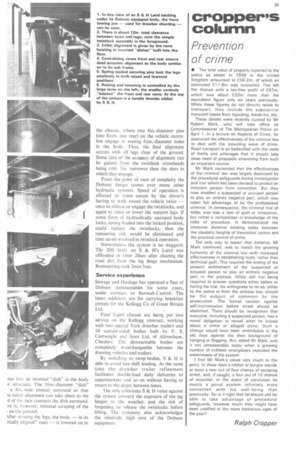cropper's column
Page 41

If you've noticed an error in this article please click here to report it so we can fix it.
Prevention of crime
• The total value of property reported to the police as stolen in 1969 in the United Kingdom amounted to £58.2m, of which an estimated £11.6m was recovered. This left the thieves with a tax-free profit of £47m, which was about £20m more than the equivalent figure only six years previously. While these figures do not directly relate to transport, they include the substantial transport losses from hijacking, break-ins, etc.
These details were recently quoted by Mr Robert Mark, who will take office as Commissioner of The Metropolitan Police on April 1. In a lecture on Aspects of Crime, he examined the effectiveness of the criminal law to deal with the mounting wave of crime. Road transport is so bedevilled with the costs of thefts and pilferages that it should take close heed of proposals emanating from such an important source.
Mr Mark contended that the effectiveness of the criminal law was largely destroyed by the procedural safeguards during investigation and trial which had been devised to protect an innocent person from conviction. But they now enabled a suspected or accused person to play an entirely negative part, which was taken full advantage of by' the professional criminal. In consequence, the criminal trial of today was less a test of guilt or innocence, but rather a competition in knowledge of the rules of procedure. It demonstrated the immense distance existing today between the idealistic heights of theoretical justice and the practical control of crime.
The only way to lessen that distance, Mr Mark continued, was to match the growing humanity of the criminal law with increased effectiveness in establishing truth, rather than technical guilt. This required the ending of the present entitlement of the suspected or accused person to play an entirely negative part in the process. While still not being required to answer questions either before or during his trial, his willingness to do so, either to the police or from the witness box, should be the subject of comment by the prosecution. The formal caution against self-incrimination before arrest should be abolished. There should be recognition that everyone, including a suspected person, has a moral obligation to reveal what he knows about a crime or alleged crime. Such a change would have been unthinkable in the old days against the then background of hanging or flogging. But, asked Mr Mark, was it not unreasonable today when a growing number of ruthless wrongdoers exploited the weaknesses of the system.
I find' Mr Mark's views very much to the point. In these days a robber or burglar stands at least a two out of four chance of escaping arrest, and, if caught, a four out of 10 chance of acquittal; in the event of conviction he meets a penal system infinitely more concerned with his well-being than previously. So is it right that he'should still be able to take advantage of procedural safeguards, however much they might have been justified in the more barbarous ages of the past?
Ralph Cropper
























































































